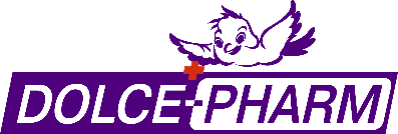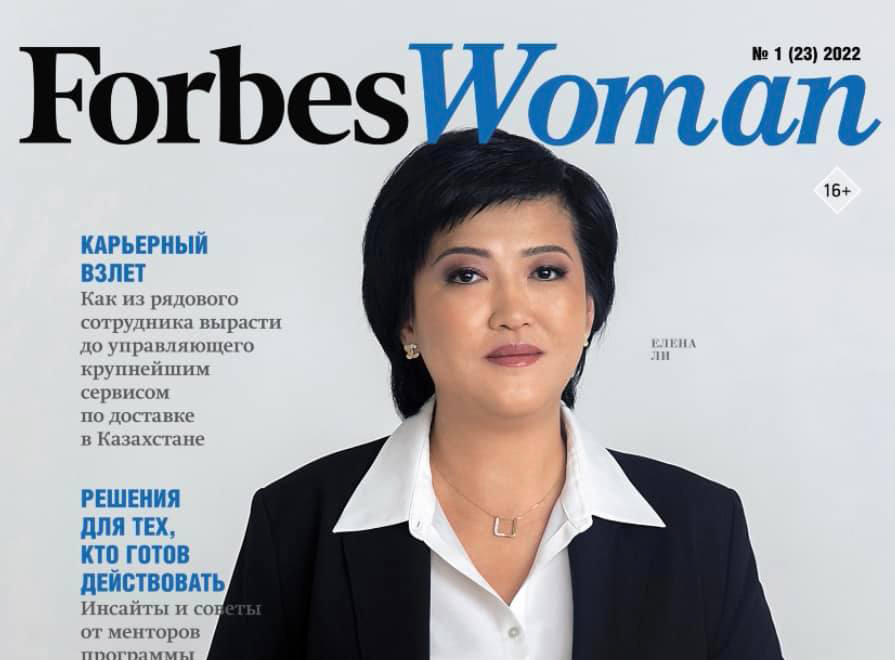Yelena Lee is an example of an entrepreneur whose professional interest grew out of the Major
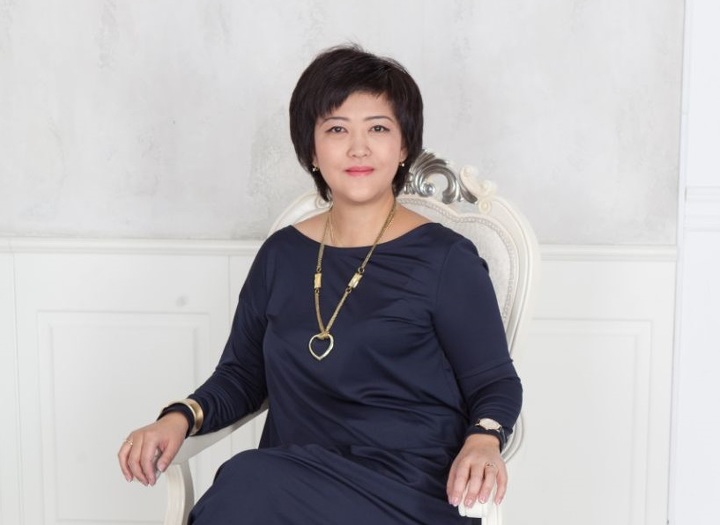
After graduating from the Faculty of Pharmacy, the Kazakhstan woman went to work in a pharmacy and a year later she moved to a wholesale company. It was there that she saw the problems of nosocomial infections. Noticing the potential of the market, Yelena gathered a team and, with $200 in her pocket, launched her own business for production and sale of disposable medical products. Dolce Pharm showed steady growth until in 2020 the pandemic began. Due to the export ban during the lockdown, the Company lost over $1.5 million but provided the country with masks and gloves. The article at Forbes Woman Kazakhstan says about how a resident of Almaty instilled a culture of using disposable medical devices in Kazakhstan.
How the Company, which will soon turn 24, began?
– There was no one to rely on in our family, but I really wanted to have my own business and team. The market was wild then, and I started trading in a rented office. In the hall of a one-room apartment there was a warehouse with racks, in the kitchen on nine square meters we had three workplaces. Together with the team, we sold everything that was allowed – dietary supplements, vitamins, medical products, adhesive plasters and more. Started with $200, turned it into $400, $400 into $600, and so on. I remember the moments when I counted every penny.
Did you start with distribution?
– First, we developed a wide distribution network for sale of disposable medical devices with partners – serious international companies such as Ansell, Kimberly-Clark. They had a very large and wide range of products and, of course, a very serious school. In 2000, our parents’ two-storey house became our office. Moreover, in the first year we were located on the first floor, and a year later we occupied the second floor. We built up a plot of 0,3 acres almost completely. Neighbors began to complain about the road in the village being sometimes blocked by large trucks and cars of clients. When sales volumes increased, we decided to open production workshop – we started with sterile gloves, then in two or three years a coal shop was created.
Was the production placed in the same place?
– We purchased a neglected building with a plot which my whole family took part in restoring. Even my husband joined our large construction site. He then bought his first Mercedes, but to somehow help me, he gave his car in exchange for restoring the heating of the entire building. And this heating system still serves us faithfully. We planned to rent out part of the premises, but two years later the Company entered a stage of rapid growth – there were no deterrent factors. And then we began to use the potential of the entire building to expand production.
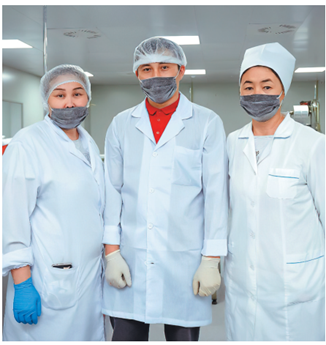
What was the key moment in business development?
– In 2011, two important events took place – a long-term contract was signed with SK-Pharmacy LLP. With this, we received impressive assistance from the state and we also took part in the program of the Accelerated Industrial and Innovative Development. This gave a big turn in the development of production and we were able to focus on quality and quantity.
When did the first serious difficulties begin?
– In 2015, when we took a big loan for construction of the plant. At the same time, the country experienced a 100% devaluation of the national currency. It is important to understand that the entire raw material component of production is imported, 70% of which we purchase in foreign currency while we receive state orders in tenge. Then the law on annual price reduction by 5% without indexation to the exchange rate was adopted. What our whole team did – all 500 people, 500 families – was act of heroism. We had salary delays and obligations… We managed to settle new prices only in 2021. Also the pandemic did not let us quickly and efficiently raise prices at the state level.
It turns out that the state does not support domestic producers?
– The state actively supports us, finds investors through KazakhExport, Kaztrade, Kazakhinvest. We travel both to exhibitions and production facilities of friendly companies. However, we continue to face a large number of obstacles for domestic producers. For some reason, right after the pandemic exports were closed for us but imports were opened, and the position of producers and importers is unequal. For some reason, laws and purchases are directed towards importers – imports are allowed under any conditions, without requirements of international certificates, and so on, and all these requirements for domestic producers have been maintained and even tightened.
How does the issue of regulation affect your production?
– Domestic commodity producers do not have any tax breaks – we have the same taxation with importers while our turnover is much lower. And the turnover period itself is lengthening – in our country it has reached once a year. At the same time, importers have six to ten turnarounds which make a working capital. It affects implementation of the strategy development program – ours is four years behind the plans. In the same pandemic, we could produce more, provide more jobs and pay more taxes, and, most importantly, save more people.
You started with production of disposable medical products. What are your products today?
– We have two companies – manufacturing and trading. The trading company sells and buys, including the products of our factory. The factory produces assortment of over 250 local items: from gloves and respirators to kits for all types of operations, plastic products – gynecological disposable speculum, containers for analyzes. All PPE used during the pandemic, respirators for the red zones – FFP-1, FFP-2, FFP-3¬¬ – we fully satisfied the country with during the pandemic. The most popular product, carbon filter masks, is my personal innovation, which we have patented. There are complex gloves – cardiac surgery, orthopedic and others.
Mr. President visited your Company in August. Why?
– The main achievement of our Company – introducing the culture of using disposable products. Today, Kazakhstan is the biggest user in Central Asia that of such products and we are even ahead of Russia in many indicators of this statistics. We have seen cases of using reusable speculum even in South Korea. Moreover, not only do we not compete with other countries but we also supply products to them.
What is the meaning of such provision for medical institutions?
– We do our best to avoid an accident at all, preventing nosocomial infections and complications after operations. The main achievement in our industry – is what does not happen. For example, the percentage of survival of intensive care patients is lower because their immune system is weakened and any secondary infection is, in fact, fatal. Doctors know and understand this and we prevent it. In surgery there are over 40 different types of viruses, bacteria, fungi, and the easiest outcome of infection here is disability.
We cooperate with over 3,800 private and public medical institutions. If you go to a Kazakh maternity hospital, absolutely all disposable products will be ours – gynecological speculum, tools, kits for women in labor and caesarean sections, diapers, bedding, clip- caps and so on. Today, no surgery, from gynecology to cardiac surgery, begins without our products. For a patient, this is an increase in the quality of life, and for the state, it means saving every bed-day.
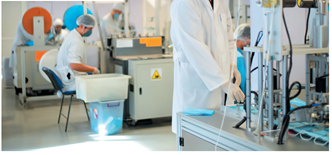
What are sales volumes in the Kazakhstan market?
– Our sales volumes are growing from year to year – before the pandemic, we were growing by 60-70% annually. Over the past three years, sales have tripled – from 3 billion 287 million to 9 billion 99 million tenge.
It was your production that satisfied the country with masks and sterile gloves during the pandemic.
– At the time of the pandemic, in January 2020, I was at the Dubai International Exhibition. China has already stopped selling everything related to masks – equipment, spare parts, raw materials. There were no stock we had no place to buy even rubber bands. Then I gave the employees the task to buy everything that stretches on the market. In a strategy session, I warned top management that we should be like the musicians on the Titanic: when everyone is jumping into lifeboats and escaping, we should play music, because we produce the necessary products. Therefore, at first we saved the country with respirators, gowns and overalls. Then we solved the issue with masks, but there was a global problem with gloves. The factory worked in four shifts with additional 50 people in each, many operations to be done manually – the automation could not stand it.
What has the pandemic given the Company?
– Almost nothing was stimulated, but it gave significance to what we have been doing all these years. The fact is that we worked before the pandemic and did not start production during the lockdown, like many other newly minted manufacturers. We provided Kazakhstani anti-tuberculosis centers with serious respirators – and it was they that came in handy for the red zone.
Who was among the customers?
– In pre-pandemic 2019, exports brought the Company over 141 million tenge. During the pandemic itself, requests from foreign companies increased sixfold – by the end of 2020 there were over three thousand requests. We really could go on sale all over the world and sell products for China itself, Singapore, Hong Kong, Switzerland, Germany, Turkey, Korea, the UN. Representatives of kings visited us. We lost over $1.5 million on gloves alone. We had to voluntarily refuse these sales and fully ensure the security of our state, because we simply could not meet the sharply increased demand. During the pandemic, the staff increased to 550 employees, and then decreased slightly. Today we employ 420 people, because initially the factory was designed to produce products for doctors, and not for the entire population.
During the pandemic, the Company faced not only production load, but also legal difficulties…
– We received a lot of penalties, withdrawal of bank guarantees and spent a lot of time trying to prove the well-known truths – the lockdown, the pandemic. To do this, it was necessary to collect certificates and documents about all stages of the arrival and departure of goods around the world where purchases were made. As a result, the entire factory turned into international lawyers. This year, the same thing continues, only now due to the roads lockdown in China. I no longer ask, “How much has the performance improved?” I ask, “What volume was collected for evidence?” Last year we reached the Supreme Court – we proved it, but it sounds ridiculous.
It turns out that the Company almost did not earn money during the lockdown?
– We did not earn much, because the country introduced price restrictions. And in general, we are faced with a very large number of pricing problems. Over the past seven years we have lost over 20 billion tenge. Most likely, if the country had not closed the export for us we would have managed to close the loan obligations. This did not happen, but we do not despair – we believe that it was much more important to save our doctors. For the Company, this is a loss, but for the team and for me personally, it is an investment in protecting health. Despite all the difficulties, we were able not only to maintain production, but also to increase it, to build a new plant. The number of manufactured products increased from 127 million to 168 million.
Where is the production located today?
– Currently the Company owns two hectares of land which is tightly built up. Therefore, the new plant has “grown” in height – we turned it into three-story building with about 3,000 square meters, built according to all modern European standards. We have specifically invested funds to obtain European certificates, on a voluntary basis – they are not required in our country, but they are needed for development of exports. In addition, we have six workshops and the total area of premises is 9 thousand sq. m. of clean rooms. Now we are gradually building a syringe plant – we hope it will be commissioned before the end of the year.
The Company grew quickly. Where did you find investments?
– Initially we used bank instruments, participated in various state programs. Until recently, we did not attract investments from outside, but today for the first time we are ready for this – we decided to unite with strategic partners and now the volume of investments is quite serious. We are working to create a pharmaceutical cluster that would comply with GXP and other international standards.
Who will be among the partners?
– We have four groups of investors – from Switzerland, China, USA and Korea. These are large corporations with experience and a well-known name, but in their own countries, which are interested in the development of pharmaceutical business. Despite the strikes that took place in the country in January and instability in the world, they are ready to invest in joint production in Kazakhstan and ensure the sale of products to Europe and other countries. Today we have signed memorandums, our Company is negotiating with the state on allocation of a land plot. In addition, we are invited to place a production site in the free zones of Uzbekistan and in clusters of other countries.
What are plans of your Company?
– Today, the Company has drawn up a development program for ten years ahead. We want to increase the depth of processing and raw material sufficiency in the country and can support a full production chain from oil, gas and even nitrile rubber with the help of Kazakhstan raw materials. From butadiene we can produce sterile gloves, from gas or propylene we can produce syringes and non-woven material. A lot of products, for example, gynecological speculums can be made of plastic.
